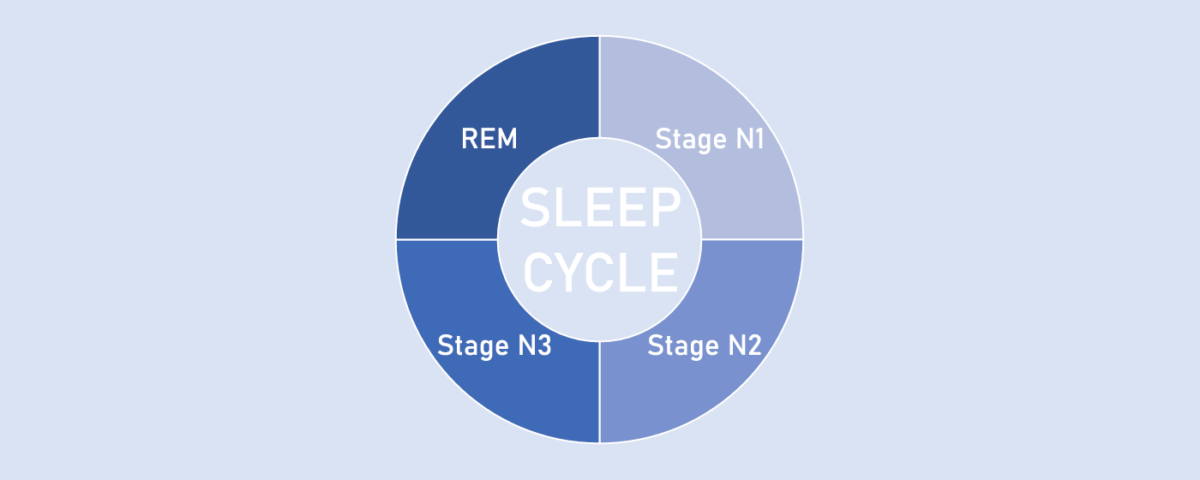Achieving more deep sleep is crucial for your overall health, as it’s during this phase that your body repairs itself and restores its energy reserves.
Understanding the various sleep cycles is important because deep sleep, also referred to as slow-wave sleep, plays a significant role in memory consolidation, detoxification of the brain, and the release of growth hormones.
To improve the amount of deep sleep you get each night, it’s necessary to focus on cultivating healthy sleep habits, such as establishing a consistent sleep schedule and creating a restful environment.
Lets go through what you can do.
Understanding Sleep Cycles

Getting deep sleep is crucial for your overall health, and it begins by comprehending how your sleep cycles work.
Each night, you go through multiple cycles that are made up of distinct stages, including both REM and NREM sleep, which are pivotal for different restorative processes in the body.
As a health and wellness company and working with many clients on their sleep, one of the most powerful things you can do is understand this and work your sleep in cycles not hours in bed.
Stages of Sleep
Your sleep cycle includes several stages that repeat cyclically throughout the night, approximately every 90 minutes.
Initially, you enter the NREM sleep, which is divided into three progressive stages:
- Stage 1 NREM: This is the lightest phase of sleep, where you drift in and out of wakefulness and sleep. It’s marked by slow eye movements and decreased brain activity.
- Stage 2 NREM: During this stage, your eye movements stop, heart rate slows, and body temperature drops. It acts as a bridge to deeper sleep stages.
- Deep Sleep (Stage 3 NREM): Also known as slow-wave sleep, this is the most restorative stage. Your brain waves slow down, and it’s hardest to wake you during this phase.
The Role of REM and NREM Sleep
The sleep stages are significant in understanding how to improve the quality of your rest.
After the initial NREM stages, you eventually move into REM sleep, which is characterized by rapid eye movement and increased brain activity, akin to when you’re awake.
This phase is known for vivid dreams and is essential for memory consolidation and mood regulation.
- NREM Sleep: This helps with physical restoration, tissue repair, and growth hormone release.
- REM Sleep: Supports brain functions like memory consolidation and learning.
Your sleep is regulated by your circadian rhythm, an internal clock that determines your sleep-wake cycle based on environmental cues like light and temperature. To nurture a healthy circadian rhythm and thus improve deep sleep, it’s beneficial to have consistent sleep patterns.
Cultivating Healthy Sleep Habits
To get more of that precious deep sleep, tweaking your daily habits can make a big difference. Here’s how to set the stage for excellent sleep quality every night.
Establishing a Sleep Schedule
Consistency is key to your body’s internal clock. Aim to go to bed and wake up at the same time every day, even on weekends. This regularity reinforces your body’s sleep-wake cycle and can help you fall asleep and stay asleep for the night.
- Everyday Timing: Try to fix a time for going to bed and for waking up that suits your lifestyle and stick to it.
- Adjust Gradually: If you need to change your sleep schedule, do it in small daily increments, like 15 minutes earlier or later.
Creating a Bedtime Routine
A calming bedtime routine signals your body that it’s time to wind down and transition to sleep. Include relaxing activities, such as reading or taking a warm bath, to help you shift into sleep mode.
- Relaxation Techniques: Consider meditation or breathing exercises before bed.
- Eliminate Electronics: Turn off screens at least an hour before bedtime to reduce exposure to blue light, which can disturb your sleep cycle.
Diet and Exercise
What you eat and how you move throughout the day can significantly impact your sleep quality.
Diet:
- Limit Caffeine and Alcohol: Avoid consuming caffeine after 2 p.m. and reduce alcohol intake, as both can disrupt sleep patterns.
- Balanced Meals: Ensure your diet includes plenty of vegetables, fruits, and whole grains to promote overall health and better sleep.
Exercise
- Regular Physical Activity: Engage in moderate exercise on a daily basis to help you fall asleep faster and enjoy deeper sleep.
- Timing Matters: Finish workouts at least a few hours before bedtime to prevent being too energized to sleep.
Each of these tips lays the foundation for better sleep hygiene. Remember, it’s the combination of a consistent sleep schedule, a peaceful bedtime routine, and mindful choices in diet and exercise that enhances your ability to enjoy deep, restorative sleep.
The Impact of External Factors on Sleep

External factors such as light exposure, noise levels, and room temperature significantly affect your ability to experience deep, restorative sleep. It’s important to tailor your sleep environment to promote relaxation and facilitate the transition into light sleep and beyond.
Understanding the Influence of Light
Your body’s internal clock, or circadian rhythm, is highly responsive to light—particularly to blue light. Exposure to bright light or sunlight can suppress melatonin production, a hormone that signals your body it’s time for sleep. Reducing blue light exposure from screens before bedtime can help increase melatonin levels, making it easier for you to fall asleep.
Navigating Noise and Sound
Unexpected sounds can jar you from a state of relaxation, preventing you from falling asleep or reaching deep sleep. To improve your sleep quality, consider using white noise machines or earplugs to manage disruptive noises that could affect your sleep.
Temperature and Sleep Environment
The right temperature can greatly enhance your sleep quality. Your body naturally cools down as you fall asleep, so maintaining a cooler room—generally between 60-67 degrees Fahrenheit—can help facilitate this drop in body heat, promoting better sleep.
Too much heat can lead to restlessness and make it more challenging to stay in light sleep or advance into deeper sleep stages.
Managing Stress and Anxiety
Getting more deep sleep often involves addressing the mental hurdles that prevent relaxation.
If stress and anxiety are compromising your sleep quality, simple strategies like relaxation techniques, meditation, deep breathing, and cognitive behavioral therapy can be highly effective.
Relaxation Techniques
To unwind before bed, engage in relaxation exercises.
Activities such as reading a book, taking a warm bath, or practicing progressive muscle relaxation can help quiet your mind. Some people may even try CBD products or a Muha Med cart to help them relax before bedtime, it is all about preference.
It’s essential to establish a soothing pre-sleep routine to signal your body that it’s time to relax and prepare for sleep.
Meditation and Deep Breathing
Incorporating meditation and deep breathing into your evening routine can profoundly impact your ability to fall asleep and achieve deep sleep.
Meditation can reduce stress levels and improve overall mental health.
Specifically, you might try guided meditations that focus on sleep, which are designed to calm the mind and promote relaxation.
Cognitive Behavioral Therapy for Insomnia
Cognitive Behavioral Therapy for Insomnia (CBT-I) is a structured program that helps you identify and replace thoughts and behaviors that cause or worsen sleep problems with habits that promote sound sleep. CBT-I can address the anxieties related to sleep, teaching techniques to break the cycle of stress and sleeplessness.
Advancing Sleep through Science and Technology
In your quest for deeper sleep, embracing the latest science and technology might offer significant benefits. By utilizing innovative gadgets and leveraging cutting-edge research, you can potentially enhance your sleep quality and address common sleep disorders.
Sleep Monitoring Devices
Your journey to better sleep can begin with sleep monitoring devices. Gadgets like smartwatches and fitness trackers have evolved to not only track your sleep patterns but also provide detailed insights about your rest. These devices often measure sleep duration, interruptions, and stages of sleep, offering you a wealth of data that you can use to adjust your sleeping habits for optimal rest.
For those with conditions like sleep apnea, specialized monitors go even further. High-tech CPAP (Continuous Positive Airway Pressure) machines not only aid your breathing but can also track and adjust their function to improve your sleep quality. Devices like these have empowered users to take proactive steps in their sleep health, sometimes revealing undiagnosed issues that can be critical to address.
Emerging Research and Treatments
Sleep science is continually uncovering new ways to combat sleep issues. For instance, new therapies are being developed that could change the treatment landscape for a variety of sleep disorders.
This burgeoning field has seen the introduction of therapies like cognitive behavioral therapy specifically for insomnia (CBT-I), which aims to change sleep habits and schedules, and address misconceptions about sleep.
These treatments often involve the use of electronic devices and health technology, such as apps and online platforms, to deliver interventions and monitor progress.
Moreover, findings in genetic studies point toward the development of personalized medicine approaches to treat disorders like narcolepsy, offering hope that treatments will become more effective with fewer side effects.
As you explore these options, remember that smart technology is not just about collecting data; it’s about improving outcomes.
Through a sleep study using high-tech tools, you can uncover specific issues disrupting your sleep and work towards a tailored solution. Keep track of advancements and consult with sleep professionals to ensure that you’re using these technologies effectively and safely.
Frequently Asked Questions

What natural methods can improve deep sleep quality?
Natural methods to aid in better deep sleep include sticking to a consistent sleep schedule, reducing exposure to blue light before bedtime, and maintaining a comfortable sleep environment. Practices such as meditation and mindfulness can also promote relaxation and potentially improve sleep quality.
Why am I not getting enough deep sleep?
There are various factors that might affect your deep sleep, such as stress, caffeine consumption, an irregular sleep schedule, and the use of electronic devices before bedtime. Underlying health issues such as sleep disorders can also impact the amount of deep sleep you get.
What are the signs that I’m not achieving sufficient deep sleep?
Telltale signs of insufficient deep sleep include feeling tired upon waking, experiencing daytime sleepiness, mood changes, difficulty concentrating, and a decreased ability to perform daily tasks effectively.
Which supplements may enhance deep sleep cycles?
Supplements like melatonin, magnesium, and valerian root are often cited for their potential to improve sleep quality. However, it’s important to consult with a healthcare provider before starting any supplement regimen.
How does the amount of deep sleep needed vary with age?
The amount of deep sleep you need can change as you age, with younger individuals generally requiring more deep sleep. Children typically need more deep sleep for growth and development, while adults might experience shorter durations of deep sleep.
Can technology like the Apple Watch accurately measure deep sleep?
Devices like the Apple Watch utilize motion and heart rate data to provide estimates of sleep stages, including deep sleep. While they can give an approximation of sleep patterns, they may not always be entirely accurate compared to professional sleep studies.
